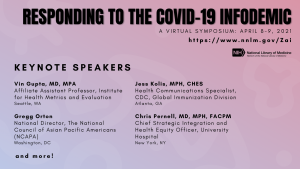Mar
26

Posted by Sarah Levin-Lederer on March 26th, 2021
Posted in: Announcements
Tags: health disparities, Health Literacy, professional development

The COVID-19 pandemic has highlighted the disparities of underserved, minority, and underrepresented communities. This includes ensuring equal understanding of accurate health information, education in hard hit communities, and valuing inclusion in clinical research to overcome COVID-19.
The NNLM Virtual Symposium: Responding to the COVID-19 Infodemic is an opportunity to address misinformation and mistrust, raise awareness about the pandemic, and efforts to combat it. Symposium attendees can expect to come away from the 2-day experience with a better understanding of COVID-19 and share strategies and programs to engage with your community.
HOW DO I REGISTER?
Free registration is now open on the symposium website: https://nnlm.vfairs.com/en/registration
KEYNOTE SPEAKERS
Day 1:
Dr. Vin Gupta, MD, MPA, Institute for Health Metrics and Evaluation, Seattle, WA
Approaching Normalcy: Forecasting the end of the COVID-19 Pandemic
Gregg Orton, National Director, The National Council of Asian Pacific Americans, Washington, DC
Not a Monolith: Asian-American Communities and COVID-19
Day2:
Jess Kolis, MPH, Global Immunization Division, Centers for Disease Control and Prevention, Atlanta, GA
De-bunk to Pre-bunk: A Necessary Paradigm Shift for Addressing Health Misinformation
Chris Pernell, MD, MPH, FACPM, Chief Strategic Integration and Health Equity Officer, University Hospital, New York, NY.
The Tale of Two Americas: How Two Pandemics Collided and Cost Black and Brown Lives and the Racial and Health Justice Mandate to Save the Future by Every Means Necessary
WHEN
April 8-9,2021
Each day starts at Noon EDT
HOW DO I REGISTER?
Free registration is now open on the symposium website: https://nnlm.vfairs.com/en/registration
WHERE
Sessions will be held in Zoom.
WHO IS THE SYMPOSIUM FOR?
NNLM invites anyone who is interested in learning more about information-related issues during COVID-19, which includes, but is not limited to: health professionals, librarians, researchers, community-based organization staff, and students.